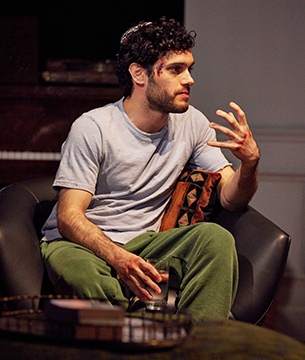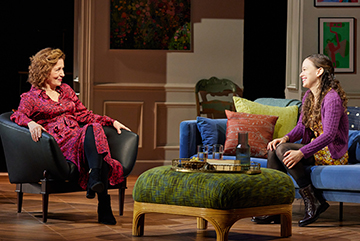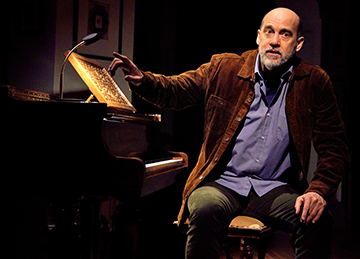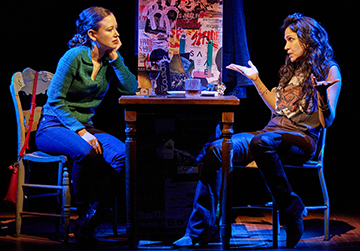By Lucy Komisar
Through the lens of one Jewish family in Paris, “Prayer for the French Republic” delves into the thorny issues of identity, racism, and anti-Semitism. And to what country you belong. Seen from an intimately human perspective, these divisive political debates couldn’t be more pointed or timely. The work by Joshua Harmon premiered off-Broadway two years ago and reopened on Broadway last month.
The setting is the bourgeois Benhamou family’s apartment on the Boulevard Beaumarchais, one of the grand boulevards, which runs from the Bastille to the Place de la République. At the heart of the play are Marcelle (a forceful, sometimes appropriately abrasive Betsy Aidem), a psychiatrist, her doctor husband, a son and daughter.
When son Daniel (Aria Shahghasem) returns home bloodied after being targeted by Arabs for wearing a yarmulka, that sparks intense argument. Marcelle wants to report the attack to police and for him to cover his head with a baseball cap when he goes out. But Daniel, 26, who teaches at a Jewish school in a “bad” neighborhood, demurs. (Marcelle tells him to sit down, but in a cultural joke, quickly adds, “Not on the sofa!”)
Playwright Harmon studies identity, oppression, and selective outrage from myriad angles. Scenes toggle from Marcelle’s great-grandparents’ harrowing experience in the Holocaust, to her manic-depressive daughter Elodie, 28 (Francis Benhamou, who changes moods effortlessly) with surprising lucidity about current events. Throughout, the characters come across as flawed, passionate people trying to make sense of a complex world.
Marcelle’s family has been in France for a thousand years, her Sephardic husband Charles (Nael Nacer) fled Algeria after the defeat of French colonialism. All is set in the context of the Holocaust, of violent anti-Semitism and Israel’s oppression of Palestinians.
Some of the extended family members are very Jewish, others secular. Marcelle explains to a visiting American cousin Molly, 20 (Molly Ranson, in the skin of a New York college kid), a year-abroad student at Nantes, that they are “traditional.” Molly rejects religion. “I’m of Jewish extraction,” she says, to Marcelle’s chagrin.
Patrick Salomon (Anthony Edwards), Marcelle’s brother, whose cultural connection seems defined by the American jazz he plays on the piano, rejects Judaism, but is very aware of the history of anti-Semitic repression. “Let’s talk about the Crusades.” They murdered a third of France’s Jews. But he notes France was the first country to emancipate Jews.
There are flashbacks to the Nazi occupation. Marcelle’s great-grandparents were targeted by the SS, but saved by the building super, who said, “It’s old people, leave them alone.” And they were alone. A daughter had fled to Cuba before the Nazis invaded, but their other children were arrested.
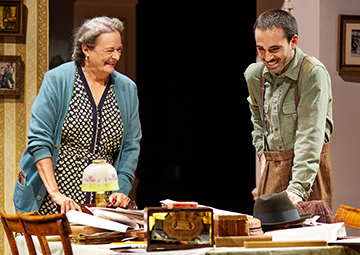
After the war, their son and his son returned to run the family piano business. Other children were murdered by the Nazis. But the couple is a bit of a caricature, and the mood is too light for the tragic situation. Though Robinette does an amazing death-bed monologue.
Molly’s debates with Elodie are highlights. Molly argues that Israel’s treatment of Palestinians undermines its moral arguments. “Maybe it’s people like you who take territory that isn’t theirs,” Molly states, bringing up settlements and human rights abuses.
Elodie, who has suddenly found her voice, asks why the world doesn’t care as much about what much larger countries such as India are doing to minorities. Molly says the U.S. is not sending billions of dollars there. “What about Egypt?”
Elodie fires back about America’s violent appropriation of the land Molly occupies, “You feel justified sitting on your stolen land” on the Upper East Side, taken from the Native Americans. It’s a nuanced debate for a society that conveniently forgets the country’s bankrolling of dictators or its genocidal origins.
A family crisis occurs when Charles returns from work shaking, he can’t breathe. The assault on Daniel has brought on a panic attack. He wants to move to Israel where it is safe. “My son can walk through Tel Aviv and not fear for his life.” (Obviously, written and set before the Gaza war.) He’s tired of seeing guards outside schools carrying machine guns.

For Charles, the solution is Israel. He takes Daniel there to look for an apartment. Now the conflict is whether he will move there when Marcelle will not. Or will she? The plot goes back and forth at dizzying speed.
A Jewish woman living nearby is killed by an Arab. Jews are 1% of the population but victims of 40% of the hate crimes. (Who the 60% are is not mentioned.)
In their arguments, Marcelle raises the threat of Marine LePen, head of a far-right party that admires the fascists and is a prominent candidate for president. “Where are Jews safe?” Marcelle asks. “Where is my family supposed to go?
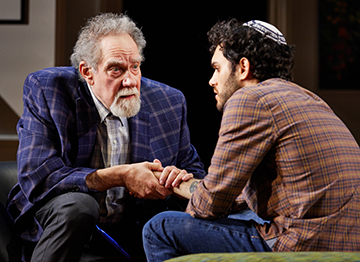
A surprise arrives with Pierre Salomon (Richard Masur), grandson of the Salomons we saw in Nazi times, now in his 80s, who we discover married a Catholic and is the father of Marcelle and Patrick. He turns the attack on French anti-Semitism on its head by declaiming that, unlike in neighboring countries, three-fourths of French Jews survived the Nazis and that France is one of the best countries for Jews.
The others riff on why people hate Jews, with arguments about communists and capitalists, the Jews as money-lenders. Guess the stirring anthem that ends the show.
The play is engrossing and the cast breathes relatable life into morally knotty arguments that careen rapidly between the Holocaust, the Crusades, Israel-Palestine conflicts, terrorism, French colonialism, the rise of far-right leaders like LePen, and more. While the script occasionally slips into melodrama, Harmon’s writing and David Cromer’s poised direction ensure the broader debates remain grounded in human perspective.
Another view comes from my theater companion, a French Jew who had just flown in from Paris but lives in New York. Her family suffered loss in the Holocaust. She said, “It [the situation in France] is not that bad. There is no Hitler. His perception of the danger is exaggerated.” I though the actors portrayed the characters just fine. But she said, “The French family is not typically French. There’s an American rhythm. They talk like Americans. It’s subtle. Though it’s mostly good.”
Still, this is a play speaking to Americans. Harmon doesn’t attempt to neatly resolve every issue, but the paradoxes of the arguments he presents are compelling.
“Prayer for the French Republic.” Written by Joshua Harmon, directed by David Cromer. Manhattan Theatre Club, Samuel J. Friedman Theatre 261 West 47th Street (bet Broadway & 8th Ave.) NYC. Tkts. Or (212) 239-6200. Opened Jan 9, 2024, closes March 3, 2024. Also on NY Theatre WIre.


